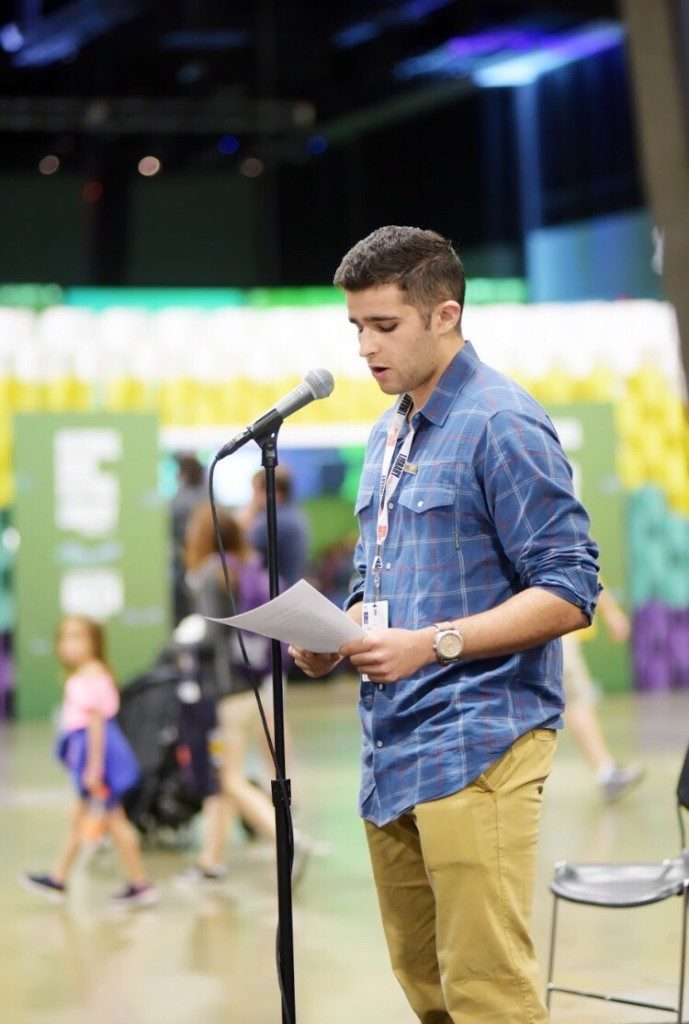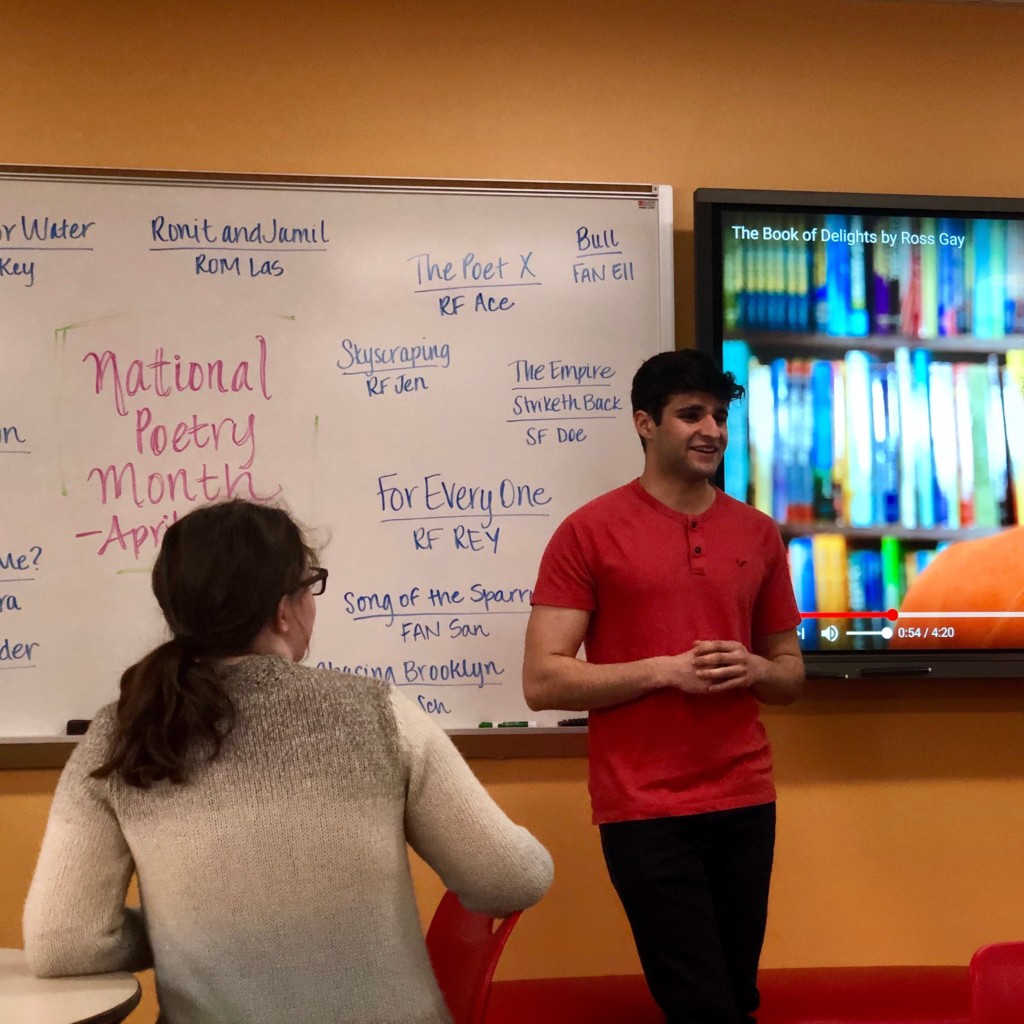When he was 12, Darius Atefat-Peckham started writing poetry. “I grew up in poetry and it felt like it had to happen, whether I liked it or not,” he says in an interview with The Utah Review.
Through a crack in the bathroom door, he read his first poem to his dad who was taking a shower. After Atefat-Peckham finished reading it, his dad told him to “keep going” on his writing.
Atefat-Peckham was writing about his grief. When he was three, his mother, Susan, and his brother, were killed in an auto accident. Atefat-Peckham survived the accident, along with his father, Joel and his grandmother. His mother was a widely published poet and his father also is a father who is on the Marshall University faculty in Huntington, West Virginia, teaching regional literature and creative writing.

Since that first writing experience, the young writer has blossomed rapidly. For the past year, Atefat-Peckham, who just graduated from the Interlochen Arts Academy in Michigan, has traveled the country, conducting workshops and reading his work. He is one of five teens in this year’s class of National Student Poets, which is coordinated by the Institute of Museum and Library Services (IMLS), the nation’s primary source of federal funding for museums and libraries, and the nonprofit Alliance for Young Artists & Writers, which presents the Scholastic Art & Writing Awards. To qualify, students receive a national medal from the Scholastic Art & Writing Awards.
As Atefat-Peckham’s year as a literary ambassador nears its conclusion, he will conduct a workshop and read from his award-winning work for the Wordfest literary arts program at this year’s Utah Arts Festival. His workshop – The Writing of Delight? –focuses on juxtaposing grief and joy in the writing of poetry. It will be held June 20 at 5 p.m. in the City Library on the fourth floor in the Special Collections Room.
While Atefat-Peckham does not have clear memories of the family members he lost 15 years ago, he says, “I knew that I had missed them, especially the absence of my brother.” As he entered his adolescent years, he “switched modes,” as he describes it, and began reading his late mother’s work. When he realized that he had gone even a few days without thinking about them, he recognized that it hurt and he decided to express that grief through his work.
Initially, Atefat-Peckham thought that he was destined to write deeply sad poems which would bring readers and audiences to tears. Recognizing the unique, even unorthodox, source of his grief, he believed at the time it was “an easier, more absolute path to poetry.”
At 14, he won a poetry contest and after a reading, a woman came up to him, sobbing and telling him how much she loved his work, even though it was so sad. However, Atefat-Peckham’s instincts already had pointed him to a different, more fulfilling perspective, to broaden the emotional textures of his work.
His role model of sorts was Ross Gay, the winner of the National Book Critics Circle Award for his work Catalog of Unabashed Gratitude (2015). In Gay’s latest published work, The Book of Delights, the writer, as a Kirkus Review notes, emphasizes “this is not a saccharine kind of delight-making but instead an exercise in extracting the good from the difficult and ugly.”
“This is the poet I want to be,” Afefat-Peckham recalls thinking when he first heard Gay and started reading his work. “It was filled with complicated emotion and not about feeling pity.” At 16, his obsession with the work of Gay and others had primed Atefat-Peckham’s writing to be just as complex in writing about the joys and griefs of his own life.
The young poet also found the sonnet form to be valuable, as he has explored the Iranian roots of his family heritage. He cites Terrance Hayes’ recen work of American Sonnets for My Past and Future Assassin also as an exemplar to strive for in his own work, which astutely frames contemporary sentiments without a tone of political partisanship.
His grandparents came to the U.S. in the late 1960s, roughly a decade before the Islamic Revolution in Iran. This fall, he will start college at Harvard, majoring in English along with an emphasis in Middle East Studies and literature. One of the reasons he chose Harvard is the opportunity to learn the Farsi language.
Each National Student Poet has taken up a specific cause or dimension in their year-long literary ambassadorship. In focusing on the writing and expression of grief and joy, Atefat-Peckham has done workshops and read in many locations, including Portland, Missouri and Harlem. Sometimes, the workshops involve experiences of heavy emotions, such as in Portland, where he worked with young LGBTQ people. The workshop in Harlem was funny and a bit goofy with kids in the third and fourth grades. His last one will be in Washington, D.C., after his Salt Lake City appearance.

Atefat-Peckham’s maturity as a writer impresses rightly so (See Christening Song below, which was published in the Lake Effect literary journal). Writing about and communicating grief is a formidable, uncomfortable, often awkward task in our culture. He can become annoyed, slightly or even more so, when people speak of memories of his late mother, as if they have canonized a saint. He prefers remembering her in all her complexities, the good and the imperfect.
In one instance at Interlochen, he met a woman with a service pet – a golden retriever. He asked her the dog’s name, which happened to be Cyrus. “I told her that I had a brother with that name,” he recalls. “She said that she did not like hearing the past tense and she asked what happened. I told her that he had passed away. She then said that I should think about seeing the dog like a visitation. That he had come back in a different form.”
Atefat-Peckham held his furor until he left. “I felt so invaded and I told my girlfriend what happened, who told me that she was just trying to help.” The experience also reinforced his objective as a writer not to wallow in grief but to look through it and find the joys in even the simplest things of daily life.
As for the workshop, Atefat-Peckham plans to suggest some prompts, such as listing what one does throughout the day and finding the things that one can experience joy for themselves. For those who are grieving, he admits that it can be a weird sensation or they are not ready for it.
For more information, see the Utah Arts Festival website. Tickets also can be purchased here.
Christening Song (published in the literary Journal Lake Effect)
I’ve been obsessed with sound of late. ‘Crazy’s’ out again,
My stepmother says, as if this woman could be crazed, who scolds
The pavement when it quakes. She says she wants me to believe
In something. If ever there were a day to believe
It’s this one:
Cyrus would have turned twenty-one the day
My father had the house alit with sound, terrified
The way he was a boy quaking with sweat. Think of it
Like a visitation, the woman explains to me. Wouldn’t he
Come back in the form of something you love? But I’ve learned
I’ve loved without him. I’ve learned that I’m terrified
Of losing my face
in so many mirrors. That I’m so alike
To the shouts of my father’s waking. Terrified but wanting,
Yes, for this animal to share my brother’s name. Terrified
With wanting to share this grief with someone who could never
Understand it. Wanting
to say, you don’t know me. To say
Your dog is an angel, woman, but he’s yours, he’s yours.


This the first time I read about Cyrus. First time to see his face who reminded me of his late mother. I cried again and again. I am kind of an uncle to him and his late mother. Both I and his grand father Bahram Atefat arrived from Iran to New York and attended the same school. We worked together and remained best friends from beginning. When I moved to Canada, married and began a life, both Bahram and his wife Farideh travelled to Canada visiting us. I became involved to raise our four children, building a house, working double shifts, etc. and contacts became far in between. When 15 years ago, through internet tried to connect, suddenly the horrible news of the car accident in Jordan and passing away of Suzan and Cyrus hit me like a wall. Since then tried often to talk to my oldest friend Bahram, with no luck. Can some one find his phone number for me?